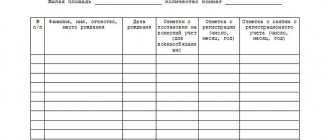Information about the recognition of a property owner as incompetent or partially capable comes to Rosreestr from the judicial authorities or guardianship and trusteeship authorities. If a transaction is made with an incapacitated copyright holder, it will be considered invalid.
An extract from the Unified State Register of Real Estate recognizing a citizen (real estate owner) as incompetent or with limited legal capacity may be required by the buyer when the seller (owner of the property) is mentally ill or demonstrates inappropriate behavior. Not any citizen, but an authorized person has the right to order an extract. Usually, obvious mental disorders can be noticed during simple communication.
What is a certificate of legal capacity?
There is no such term in the legal field. The term “certificate of sanity” is usually understood as documents from specialized medical institutions proving that the citizen has not undergone treatment and is not registered in the following dispensaries:
- drug treatment;
- psychological.
The document confirming the absence of drug addiction and mental disorders contains the following data:
- name of the medical institution responsible for issuing the certificate;
- Full name of the citizen who applied for information;
- time of examination;
- details of the psychiatrist who made the diagnosis;
- medical examination results;
- signature of the attending physician and his seal;
- seal of a medical institution.
A certificate of legal capacity of an elderly person is issued based on the results of an examination at a drug treatment clinic. This paper displays the same information as the document from the IPA.
Where can I get a certificate?
As stated above, if a citizen has been officially declared incompetent, the notary will receive such information from the federal register. A certificate from medical institutions can only confirm the fact of registration in a psychoneurological dispensary at the place of residence, which does not necessarily entail incapacity.
To obtain a notary certificate, you need:
- contact the psychoneurological dispensary at your place of registration (if you receive a certificate in another place, you will have to undergo a full examination, requesting data from the PND at your place of residence);
- the certificate must bear the seal of the medical institution, the signature of the chief physician of the ICP or clinic;
- in most cases, a certificate from the PND at the place of permanent residence can be obtained on the day of application.
The certificate is issued in the form prescribed by Order of the Ministry of Health of the Russian Federation No. 441-n. The document does not indicate the nature of the disease and diagnosis, but notes the fact of registration at a psychoneurological dispensary. Naturally, if the citizen was not registered with the PND, this fact will be confirmed in the certificate. Please note that providing a PND certificate when drawing up wills or certifying contracts is not a mandatory requirement of the law. Therefore, you can refuse to submit a certificate and have the right to contact another notary body. However, the notary is also obliged to refuse to perform notarial acts if there are doubts about the mental health of the applicant.
Please note that providing a PND certificate when drawing up wills or certifying contracts is not a mandatory requirement of the law. Therefore, you can refuse to submit a certificate and have the right to contact another notary body. However, the notary is also obliged to refuse to perform notarial acts if there are doubts about the mental health of the applicant.
How is a person declared incompetent?
There are two types of incapacity:
- According to the age. In accordance with the norms of current legislation, persons over 18 years of age who do not have mental disorders are considered legally competent. Children aged 14-18 years have partial legal capacity. They have the right to make real estate transactions and sign important documents. However, this will require parental consent.
- Due to mental disorder. If an adult is not able to give an adequate assessment of his actions and is not responsible for their consequences, then he may be declared incompetent. To do this, he will need to undergo a medical examination and obtain the appropriate certificate.
Good? Sign
Such checks are especially necessary, for example, when registering real estate or inheritance. According to the law, a notary is simply obliged to check the legal capacity of the citizen who has applied to him. A mistake here can be very costly. But how to carry out such a check?
Since notaries themselves are not psychiatrists, people in a notary office are not subject to any special tests. The procedure is not supposed to be medical, but purely legal: the notary will send the request where necessary and will wait for an answer. And there, either “yes” or “no”. Rosreestr can answer such delicate questions.
“As an experiment, notaries of the Kaluga Regional Notary Chamber have already sent several similar requests,” the Federal Notary Chamber told RG. The response may take from several hours to a week, depending on the workload of the registration authorities’ specialists. By modern standards, this is too long. However, there is hope that in the future the process should go faster; now the main thing is to perfect the technology. Reportedly, notaries request information from Rosreestr whether a citizen has been declared incompetent by a court of law or not. “We would like to remind you that the Federal Service for State Registration, Cadastre and Cartography is the only organization that receives information from the courts on such claims,” experts say. “The justice authorities do not have their own database.”
Bankers even proposed creating a single database of mentally ill people. True, doctors considered the idea unethical
By the way, not only notaries are faced with the problem of assessing a person’s adequacy. In any business, it is important to know how normal the person sitting in front of you is. For example, at the beginning of the year there was information in the press that bankers intended to come up with a proposal to create a unified federal database of mentally ill persons. According to the plan, all mental hospitals in the country were supposed to post information there. If you have registered a person somewhere, you should immediately send a notification to the appropriate place. Cured - you must remember to delete it from there, otherwise there will be no problems.
However, not everyone supported the idea. According to doctors, the creation of such a database is contrary to medical ethics. Be that as it may, we have not yet heard about the promotion of the initiative. Moreover, from a legal point of view, the doctor’s diagnosis itself is not the main thing. It can, of course, be taken into account, but only a court has the right to declare an adult incompetent. The very fact that a person is being examined somewhere and, perhaps, is even taking some medications for his head, should not interfere with his life. It is necessary that his insanity becomes a legal fact. According to the law, the court can declare a person completely incompetent or partially incompetent. For example, alcoholics and gambling addicts can be partially deprived of the right to manage their lives in court.
By the way, the opportunity to limit the legal capacity of gambling addicts appeared after the adoption of the first block of major amendments to the Civil Code. However, if an avid gambler comes to a notary’s office, say, to sell an apartment, how can he be distinguished? How do you even know that a person knows what he is doing? “The problem of checking legal capacity has been facing the notary for a long time and is acute,” says the Federal Notary Chamber. — Until now, one of the most important notarial functions was implemented empirically - the notary, relying on his experience and subjective assessment of the citizen’s behavior, decided to refuse to perform a particular action or not. The notary did not have access to any official sources of information about the mental state of the potential participant in the transaction. All the lawyer could do was just ask for a certificate from a psychoneurological dispensary. Moreover, the absence of such a document could not be regarded as a sufficient basis for refusal to perform a notarial act.” The request to Rosreestr is sent electronically through the Unified Information System of the Russian Notary Office, where the corresponding section has appeared.
In addition, the Federal Notary Chamber and the Federal Migration Service have agreed to cooperate: notaries will be able to check the authenticity of the passports of arriving citizens. Such measures are necessary, among other things, to introduce mandatory notarization of real estate transactions. According to the law, we recall that the notary will collect a complete package of documents and verify the legality of the transaction. Citizens will receive a complete guarantee of safety. The notary himself will pay for a possible mistake.
When is a certificate of legal capacity requested?
Providing such a certificate is not a mandatory condition when concluding a purchase and sale agreement. In addition to a notary, confirmation of legal capacity can be requested by the buyer of real estate. The seller has the right to refuse a medical examination. Then the buyer can take a risk and conclude a deal or refuse to sign the contract.
A certificate of legal capacity is requested in the following situations:
- The property is being sold by an elderly person. It often happens that older people are not aware of their actions. Subsequently, relatives may challenge the transaction due to the inadequacy of one of the participants. This way you can cancel a contract of gift, exchange, or purchase and sale. If the claim is satisfied, the defendant will be required to return the purchased object, which will entail a loss of money for him. Therefore, it is better to play it safe and require the seller to undergo a medical examination.
- Suspicions arose about the sanity of the opponent. If the person with whom you are planning to conclude an agreement behaves strangely, has an unnatural reaction or a retardation of consciousness, then you can ask him to present a certificate from the IPA.
- If you suspect alcohol or drug addiction. Alcohol abuse may amount to incapacity. Therefore, it is important to make sure that the second party to the transaction is free from any pathological habits.
Certificates from ND and PND - what are they?
When selling an apartment, realtors sometimes require a certificate from the Seller from the ND and PND , citing the desire to make sure that the Seller is fully capable .
A certificate from the ND is a certificate from the drug treatment clinic at the place of residence of the Seller stating that he is not registered with them. If he is registered, then his legal capacity is in question.
A certificate from the PND is a certificate from the psychoneurological dispensary at the Seller’s place of residence stating that he is not registered with them. If he is registered, then his legal capacity is in question.
♦ Example of a certificate from the IDP for the seller of an apartment ♦ (Click! Opens in a pop-up window.)
But! Important clarification! If the Seller is registered in the ND or PND , this does not indicate his incapacity (this issue can only be decided by the court), but it increases the risks of the transaction associated with possible incapacity .
And the opposite situation - if at the time of concluding the transaction there was no court decision on incapacity , then subsequently there is still a risk of challenging the transaction for this reason. The court may recognize the Seller as incompetent or limit his legal capacity after the transaction, and consider that at the time of its completion he did not understand the significance of his actions (Article 177 of the Civil Code of the Russian Federation). And this is already a reason to invalidate the transaction.
For those who are registered with ND or PND , this risk is obviously higher. To reduce this risk, appropriate certificates are taken.
True, there is good news for the Buyer of the apartment: since March 2015, paragraph 2 of the above-mentioned Article 177 of the Civil Code of the Russian Federation has been supplemented with a condition under which the transaction can be declared invalid if the Seller was subsequently limited in legal capacity , and considered that at the time of the transaction he did not understand the meaning of his actions, and (important!) The Buyer knew about it (i.e. he saw that the Seller was mentally ill, but still made a deal with him).
At the same time, one should not confuse the concepts of “recognized as incompetent” and “limited in legal capacity”
Features of obtaining a certificate of legal capacity
To declare a person incompetent, it is necessary to go to court. To prove the presence/absence of drug addiction or psychoneurological problems, you must apply for a certificate from the following institutions:
- Drug Dispensary;
- PND or psychoneurological clinic.
The person who will undergo the examination must appear in person at the medical institution. He will have to collect the following documents:
- passport of a citizen of the Russian Federation (if the document is at the registration stage, then a temporary certificate is presented);
- military ID (on request);
- insurance policy (if required);
- registration certificate.
Foreign citizens must present a passport or refugee certificate to undergo a medical examination.
Can a person registered with the PND have legal capacity?
Receiving treatment in a psychoneurological dispensary does not mean that a person is incompetent. Such issues are resolved in court. If the court declares a citizen insane, he will not be able to take part in property transactions. In addition, such a decision can cancel previously concluded contracts with the participation of an incapacitated citizen.
Also, a person registered with the PND may be recognized as legally competent. If the court has no doubts about the citizen’s sanity, he will receive the right to participate in transactions with movable and immovable property.
The procedure for declaring a person incompetent in 5 steps. Instructions for independent use.
A person can only be declared legally incompetent through a court procedure. However, before starting the trial, you need to check whether you have the right to file such an application in court, whether you have enough documents to submit the application, and what the prospects for the case being heard in court are.
Step 1. We check your right to apply to court to declare a person incompetent.
The law limits the circle of persons who have the right to apply to the court to declare a person incompetent.
An application to recognize a person as incompetent can be submitted to the court only by family members or close relatives of the incapacitated person (parents, children, brothers, sisters), regardless of whether they live together with him (Article 281 of the Civil Procedure Code of the Russian Federation).
And if there are none or they do not show initiative, then the following may apply to the court in the interests of the incompetent:
- guardianship and trusteeship authorities at the place of residence (registration) of the incapacitated person;
- medical institution (psychiatric hospital) in which the incapacitated person is being treated;
- social institution (nursing home, boarding school, etc.) in which the incapacitated person is located.
If you are not a family member or relative of an incompetent person, then you do not have the right to apply to the court to declare the person incompetent. The judge refuses to consider the application if it is filed by a person who does not have the right to do so.
In this case, you need to contact the guardianship and trusteeship authorities at the place of residence of the incompetent person or the medical institution at the location of the incompetent person and ask the heads of these institutions, on their own behalf, to apply to the court for recognition as incompetent.
A person’s lack of the right to go to court does not deprive him of the right to become a guardian after the court recognizes the person as incompetent at the request of the guardianship authorities or a medical institution.
If you are part of the circle of people who have the right to go to court, then the next step is to check the documents required to file the application.
Step 2. We check the availability of documents necessary to apply to the court to declare a person incompetent.
In order to apply to the court to declare a relative or family member incompetent, you must have documents in your hands confirming your relationship with him. Such documents may be a birth certificate for children or parents, a marriage certificate for a spouse. In the case of a more distant relationship, the entire chain of family ties must be confirmed to the court.
If your last name differs from the last name indicated on the certificates, be sure to confirm the change of last name with a document.
Before going to court, you need to find out in which medical institutions your relative has been observed and registered recently, and, if possible, collect available medical documents (certificates, discharge summaries).
The collection of medical documents is complicated by the fact that they are not issued by medical institutions to third parties by law.
If the incapacitated person does not have medical documents on hand, it is enough for the court to indicate in which medical institutions he was observed and registered. The judge will independently make a request and request the necessary medical documentation.
If you have the documents necessary to go to court, then in order to begin the legal process you need to prepare an application.
Step 3. We draw up an application for recognition as incompetent.
An application to declare a person incompetent must be in writing and must comply with the requirements of the law.
The application must indicate whether the citizen has a mental disorder and arguments about why he cannot understand the meaning of his actions or control them (Article 282 of the Civil Procedure Code of the Russian Federation).
It is advisable to indicate in the application the medical diagnosis of the incapacitated person or signs of his mental illness that are manifested in behavior. For example, he does not recognize his relatives, regularly forgets to turn off the gas, goes out in clothes that are out of season, does not realize the value of money, does not understand the meaning of documents and actions, and is aggressive towards others.
The statement must clearly indicate how the person’s incapacity manifests itself and why he cannot make decisions independently.
The application must indicate the medical institutions in which the incapacitated person was treated, registered, observed, and where his medical diagnoses or signs of mental disorder could be recorded.
Also, the application must indicate the degree of relationship between the applicant and the incapacitated person.
If you decide to draw up an application for recognition of incapacity yourself, then you need to fill it out correctly.
The applicant must be the person who applies to the court with a request to declare a relative or family member incompetent.
The person interested in the case must indicate the person recognized as incompetent.
Also interested parties in the case will be:
- guardianship and trusteeship authorities at the place of registration of the incapacitated person;
- medical (social) institution in which a person incapacitated at the time of going to court is undergoing treatment.
The following documents must be attached to the application submitted to the court:
- copies of medical documents confirming the presence of mental illness in a person declared incompetent;
- copies of documents confirming the relationship between the applicant and the incapacitated person;
- documents confirming the place of residence (registration) of the incapacitated person (extract from the house register, copy of the passport);
- other documents related to the case.
If the applicant does not have medical documents of the incapacitated person, it is sufficient to indicate in the application the medical institutions from which the court can request them.
If there are no documents confirming the place of registration of the incapacitated person, the court must indicate the exact address of his place of residence.
The application can be accompanied by evidence of the incapacitated person’s painful condition, for example, photographs, statements to the police regarding the incapacitated person’s behavior, etc.
Step 4. Submitting an application for recognition of incompetence to the court.
The procedure for filing an application for recognition as incompetent to the court is provided for in Article 281 of the Civil Procedure Code of the Russian Federation.
We select the court to which the application is filed. If the incompetent person is at home at the time of filing the application to the court, then the application is submitted to the district court at the place of residence (registration) of the incompetent person.
If at the time of applying to the court the incompetent person is in a medical or social institution, then the application is submitted to the district court at the location of this institution.
The application for recognition as incompetent and the documents attached to the application are submitted to the court in at least 4 copies (for the court, for sending to the incompetent person, for the guardianship and trusteeship authorities, for the prosecutor). And if the incapacitated person is in a medical (social) institution, then in 5 copies (another copy for sending to the appropriate institution).
Only copies of documents are submitted to the court; the originals remain with the applicant and are presented to the judge for review at the court hearing.
An application with a set of documents is submitted to the court in person or sent by mail to the court’s address with a list of the contents and a notification of delivery.
When submitting documents to the court in person, on one copy of the application it is necessary to obtain a mark (incoming stamp) from the court about the acceptance of documents by the court; a copy with a mark from the court regarding the acceptance of documents is kept by the applicant.
One copy of the application for recognition as incompetent and the original documents remain with the applicant.
After the claim is received by the court, in accordance with the rules of document flow established in the court, the application is registered in the electronic database of the court, the case is assigned a number and the materials are transferred to the judge for review. After studying the materials, the judge can either set a date for the court hearing (if all documents are prepared correctly) or leave the application without progress, as well as return the application if errors were made when filing the application.
If the court decides to set a date for trial, the applicant is sent a summons.
In cases of recognition of incompetence, information about the case (about the receipt of the case in court, about the registration number of the case, about the judge to whom the case was transferred for consideration and about the date of the court hearing on the claim set by the court) is not posted on the court’s website for public viewing.
I recommend that after the expiration of 5 working days from the date of filing the application with the court, you personally contact the court to obtain information about the progress in the case.
Step 5. Trial. Forensic psychiatric examination. Obtaining a court decision declaring incompetent.
An application to declare a person incompetent is considered by the court according to the general rules of judicial proceedings, but with some peculiarities. You can familiarize yourself with the general procedure for considering a case in court in our article, indicate the title of the article.
Now we will look at the features of the trial to declare a person incompetent.
Consideration of an application to declare a person incompetent consists of two stages: a preliminary court hearing and the main court hearing.
The court considers an application to recognize a citizen as incompetent with the mandatory participation of the applicant, the prosecutor, a representative of the guardianship and trusteeship authority, and the incompetent person himself.
During the consideration of the case, the applicant substantiates his application to the court, indicates the reasons why he considers it necessary to recognize his family member or relative as incompetent.
The guardianship and trusteeship authorities and the prosecutor participating in the case give their opinion on whether they support the application for declaring a person incompetent, whether this is in his interests, or whether they object to such recognition.
An incompetent citizen is invited to a court hearing if his personal presence in court does not create a danger to his life or health or to the life or health of others. He has the right to give explanations on the case, express his attitude to the statement, and justify the reasons for his behavior.
If a citizen’s personal participation in a court hearing is impossible, the law allows for a mobile court hearing, in which the judge goes to a medical or social institution at the location of the incapacitated person to question him.
When considering the case, the judge takes into account medical documents from the hospital, clinic, psychoneurological dispensary and other institutions about the past and current mental state of the person, testimony of witnesses, and other evidence indicating that the person cannot account for and control his actions.
At the preliminary court hearing, the judge, having examined the application, the documents attached to it, having listened to the applicant, the person recognized as incompetent, the position of the guardianship and trusteeship authorities, as well as the prosecutor, determines whether there is enough data indicating a mental disorder of the citizen or not. The judge also decides to request additional medical documentation if it is not sufficient for the case.
If sufficient data is provided indicating a citizen’s mental disorder, the court orders a forensic psychiatric examination in the case. The examination can be carried out either on an outpatient or inpatient basis, depending on the condition of the person recognized as incompetent, his location and the specific circumstances of the case.
If the court has ordered a psychiatric examination on an outpatient basis, and the incompetent person refuses to undergo it, the court may issue a ruling on the forced referral of the citizen for a forensic psychiatric examination (Article 283 of the Code of Civil Procedure of the Russian Federation).
After a forensic psychiatric examination has been carried out and experts have prepared a conclusion on the case, it is sent to the court.
The judge, having received the results of the forensic psychiatric examination, schedules the main court hearing, in which, taking into account the results of the examination, he studies the case materials, hears the participants in the process and makes a decision on whether to grant the application and declare the person incompetent or to refuse the application.
The law exempts the applicant from paying state fees and from paying for a forensic psychiatric examination (Article 284 of the Code of Civil Procedure of the Russian Federation).
However, if the court, when considering the case, establishes that the applicant acted in bad faith for the purpose of knowingly unjustified deprivation of legal capacity of a citizen, then all costs associated with the consideration of the case will be recovered from the applicant.
The period for consideration in court of a case declaring a person incompetent takes approximately two to six months and depends on the duration of the examination, the workload of the court considering the case, as well as on the correct preparation of the application, the documents attached to it and the position chosen by the applicant.
Within 30 days after the court makes a decision declaring him incompetent, it enters into legal force and is the basis for the registration of guardianship.
If a person declared incompetent does not agree with a court decision, he has the right to appeal the decision to a higher court within 30 days from the date of its adoption.
Also, the applicant, the guardianship and trusteeship authorities, and the prosecutor have the right to file an appeal against the court decision if they believe that the court decision violates the rights and legitimate interests of the person in respect of whom the case was considered.
Validity period of the certificate of legal capacity
It all depends on the purpose of drawing up such a document. The following options are possible here:
- If the certificate is needed to purchase a weapon, its validity will be six months.
- A document for traveling abroad is valid for 3-6 months.
- A certificate from a psychoneurological dispensary for concluding real estate transactions is valid for 12 months.
Thus, a certificate of sanity may be required when concluding some transactions. The presence of such a document will reduce the likelihood of contract cancellation and will avoid problems in the future.
Registration procedure
If there are doubts about the sanity of a party to the contract, she must obtain a document confirming her mental health. In medical practice, there is no medical certificate of legal capacity, so when registering an agreement, you can simply take a conclusion from a psychoneurological dispensary.
A certificate to confirm legal capacity for a notary must contain the following information:
- full name of the medical institution where the conclusion is issued;
- full name, place of residence and date of birth of the patient;
- a conclusion that the applicant has been recognized as legally competent;
- date of issue;
- Full name. and the doctor's signature.
Medical certificates must be affixed with the specialist’s seal and the stamp of the medical institution. Without the official seal of the dispensary, the medical report will not have legal force.
When visiting the dispensary, you must take your passport with you. You can obtain such information from the PND only on a paid basis.








